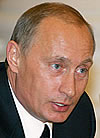20 Dec 2007 | Comment

Coverage of the recent Duma poll and forthcoming presidential race suggests that Russian media increasingly only functions to endorse the government line, writes Oleg Panfilov
On 12 December, Vladimir Putin had an official meeting with the Chairman of the Central Election Commission, Vladimir Churov, and with the chairmen of several regional election commissions. The president offered his congratulations with regard to the Constitution Day and thanked them for the ‘highly professional work’ done during the campaign season of the State Duma elections.
The Central Election Commission is an officially independent organisation, so this meeting, and many others like it, could be viewed with some surprise. However, the reality is that Russians are not surprised or worried about this in the slightest. Political aggression from President Putin’s supporters has long been the norm, and it does not seem to upset anyone. On the contrary, such behaviour is widely welcomed, as many regard Putin’s actions to be an expression of masculine power, supreme courage and strong arm tactics.
(more…)
30 Nov 2007 | Comment

Vladimir Putin is ultimately responsible for last weekend’s oppression of political demonstrations, writes Oksana Chelysheva
There are two Russias nowadays. One is of Putin, with his images on every other bill board, trying hard to crush, scare and harass the other, democratic Russia.
Late Sunday evening I spoke by phone with Ella Poliakova, the chair of Soldiers’ Mothers’ Committee of Saint Petersburg. She had spent almost eleven hours in a police station. She was not detained during last weekend’s violently crushed march of dissent. Ella followed her friend Natalia Evdokimova, the chair of the Human Rights Council of Saint Petersburg, onto a police bus. She told me: “I heard an OMON [the militia of the internal affairs ministry] colonel ordering, “Detain that woman in the red overcoat”. He pointed at Natalia. I immediately rushed to her when she was being taken to the OMON bus.” A few hours later she was charged with resisting the police and participating in an unsanctioned rally.
(more…)
7 Oct 2007 | Russia
Just before my last trip to Chechnya in mid-September my colleagues at Novaya gazeta began receiving threats and were told to pass on the message: I shouldn’t go to Chechnya any more, they said, because if I did my life would be in danger. As always, our paper has its “own people” in the General Staff and the Ministry of Defence – I mean those who shares similar views to our own. We spoke to people at the ministry but, despite their advice, I did go back to Chechnya, only to find myself blockaded in the capital, Grozny. The city was sealed off after a series of strange events there. Controls were so tight you couldn’t even move between different districts within the city, let alone make your way out of Grozny on foot. On that day, 17 September, a helicopter carrying a commission, headed by Major-General Anatoly Pozdnyakov, from the General Staff in Moscow was shot down directly over the city. The general was engaged in work quite unprecedented for a soldier in Chechnya. (more…)
26 Sep 2007 | Comment
The recent developments into investigations of Russian journalists’ murders, the attempts to accuse publicists and writers in extremism and other crimes along with Duma’s legislation activities, prompts the thought that the major task of Russian authorities is to fight against media and writers, rather then criminals.
On 12 September, Kommersant reported that the prosecutor’s office of Moscow Central Administrative District closed the criminal investigation into the March death of Kommersant defense correspondent Ivan Safronov because of ‘an absence of foul play’.
Safronov threw himself out of the staircase window in his apartment building without any obvious reason: he had a successful career and happy family life. He was a respected military correspondent who often covered sensitive issues in the fields of defence, army and space. The prosecutors opened a criminal case on ‘incitement to suicide’, but failed to find either those who may have prompted the journalist to commit suicide, or any personal motives for taking his own life. At the same time, according to Kommersant’s deputy editor, Iliya Bulavinov, investigators totally neglected the possibility of work-related inducement to suicide, and the case was not fully investigated.
On 27 August, the Prosecutor General Yuri Chaika claimed the arrest of 10 suspects into the prominent investigative reporter from Novaya gazeta, Anna Politkovskaya. Four of the suspects have been charged. Chaika also reported that besides the members of a criminal gang, some current and former police and Federal Security Service officers helped organising the murder. The reports brought some hope to the murdered journalists’ families and colleagues, as this was the first more or less effective investigation following around 47 murders of journalists in Russia since 1992, considered work-related.
However, in the two days following Chaika’s report, two former policemen, suspects in Politkovskaya’s murder, were released. Moreover, the prosecutor’s statement on the masterminds of the murder seriously confused the journalist’s colleagues. Novaya gazeta’s Roman Shleinov reported that the Prosecutor General ‘repeated almost word for word a statement President Vladimir Putin made in the immediate aftermath of Politkovskaya’s murder, blaming forces outside Russia for attempting to undermine the current situation in the country.’ For Novaya gazeta’s journalists this was a sign that any further investigation would be politically influenced.
Politicised murders are very hard to investigate, given the high level of corruption in Russian law enforcement agencies. Nevertheless, some serious cases are actually investigated, although the investigations rarely lead to charges.
In June 2004, well-known St Petersburg journalist Maksim Maksimov disappeared. The investigators managed to find and arrest the suspects. Two witnesses provided a full description of Maksimov’s murder, and others added details. The story appeared in local and international media many times. But since the suspects were experienced officers from the corruption division of Internal Affairs Ministry, the prosecutors had trouble bringing them to justice. The formal reason for this is the fact that journalist’s body was never found. Meanwhile, unofficial sources says, the suspected officers boast that they have high-ranked patrons who will soon help them to get free.
Yet, Manana Aslamazyan, the head of the Educated Media Foundation, the organisation which provided professional training for Russian journalists, after mistakenly violating the administrative code, was branded a criminal right away. The foundation was shut down. In Nizhny Novgorod police confiscated all Novaya Gazeta’s computers ‘to check for unlicensed software’; Krasnodar prosecutors found ‘signs of extremism’ in the books of respected political scientist Andrey Piontkovsky; Moscow prosecutors threatened the lawyer and writer Pavel Astakhov with a libel case, because Astakhov had described corrupt Russian policemen in his novel. The well-known historian and journalist Vladimir Pribylovsky is suspected of extremism. The celebrated satirist Victor Shenderovich is suspected of inciting ethnic and national hatred. When someone shot at Moscow investigative reporter Andrey Kalitin, police refused to open a criminal case based on murder attempt, insisting that this was just a case of hooliganism.
The state Duma seems to support these developments. The parliament’s lower chamber is ready to consider a new bill that bans mentioning the nationality and religion of crimes and their victims. Rather then beating nationalism and extremism, this law will obviously hamper spreading the information on hate crimes and nationalism in Russia. The previous Duma’s anti-extremism amendments gave the law enforcement agencies more opportunities to silence journalists and suspend media.
Investigating contract-style murders, disappearances, and motiveless suicides, is certainly much more difficult then bringing libel cases and catching journalists and educators red-handed for rules violations. Hopefully, the new government, which is meant to fight corruption, and the next parliament, will at least change the priorities in the work of law enforcement agencies. Otherwise, when it comes to the journalists and writers, this work looks more like witch-hunting than fighting with criminals.


